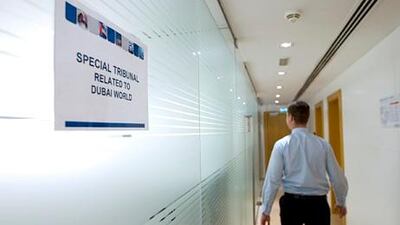Since the Dubai World crisis of 2009, some broad strategic elements have emerged in the approach of the emirate's financial authorities towards debt: for example, bond and sukuk obligations have been met in full and on time, whereas bank creditors have, largely, been asked to come up with a new term sheet.
Apart from that fairly consistent distinction in the way bondholders and banks have been treated, Dubai's financial authorities and indebted government related enterprises (GREs) have adapted, improvised and ad-libbed their way through the regular rounds of confrontations between creditors and borrowers.
So far, the tactics have been successful in defusing the debt crisis that at one stage threatened to explode the emirate's financial system. But a critical stage still lies ahead.
Just in the past few weeks, there have been three examples of the emirate's innovative approach to debt. Perhaps the most significant was the deal reached by Dubai Group (part of the Dubai Holding conglomerate) with four creditors, led by Royal Bank of Scotland, to resume talks over a parcel of some US$330 million (Dh1.21 billion) owed to the banks.
The deal - if it goes through - will halt a legal action launched in London last year by the creditors. As well as being controversial in itself - legal actions against GREs are rare - the London action also threatened to delay a resolution of the much serious issue of the $10bn of unrestructured debt owed by Dubai Group.
The RBS-led deal is yet to be finalised, and there are many issues to be resolved before debt relating to Dubai Holding can be put in the folder marked "done".
One intriguing detail to emerge from the RBS deal is that the banks have agreed to accept 18.5 cents as repayment on each dollar of their loans. If that's an indicator of the kind of settlement that might be expected with Dubai Group, it is a significant "haircut" sustained by the creditors and a good deal for Dubai.
Another recent example of Dubai's willingness to improvise came in the case of Zabeel Investments. Zabeel, which has been managed for some time by a unit of Dubai Real Estate Corporation, has been trying for two years to renegotiate $1.6bn of debts. Legal threats have also been flying in this case.
But the sting has been taken out of the Zabeel affair by a decision to set up a special judicial committee to consider the case. Three UAE experts - two judges and a counsellor - will "hear and settle" any claims against Zabeel, according to the documentation that set up the tribunal.
One might have expected some claims of "special treatment" with the setting up of the Zabeel tribunal, effectively bypassing the courts of the Dubai International Financial Centre (where Zabeel was once registered), but that is not the case.
Certainly nobody at DIFC Courts seems concerned about the development, which is regarded as normal practice in the emirate.
The third example came a couple of days ago, with reports that Amlak Finance, the Islamic mortgage provider, was in talks with creditors over $2bn of debt.
Amlak was one of the early casualties of the Dubai property crash and has been on the critical list for at least the past two years. Resolving its indebtedness is a priority, but should not be too problematic when it has the backing of 45 per cent shareholder Emaar Properties, itself backed by the asset-rich Investment Corporation of Dubai.
But there is an urgency about the Amlak situation that suggests a resolution of its problems should not be too drawn-out: the UAE mortgage industry and the Islamic financial sector are both high on the priority schedule for policymakers at the moment.
These three examples each show that, slowly but surely, Dubai is getting there on debt. Repayments and restructurings this year look none too demanding, and are broadly on track.
However, it is important that Dubai clears the decks this year. The IMF calculates total debt in the emirate still in the region of $110bn, and the bulk of that falls due from 2014 to 2016. The debt deals done this year will pave the way for much bigger challenges ahead.

